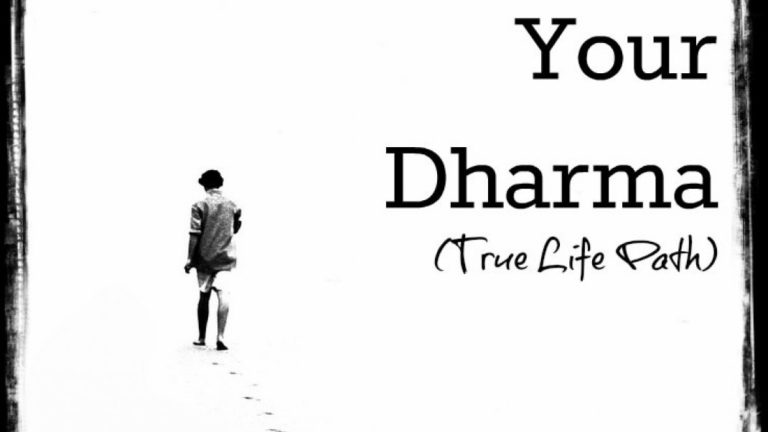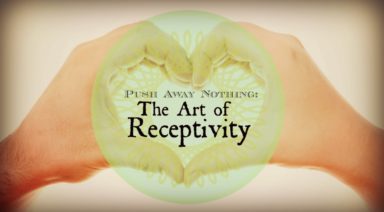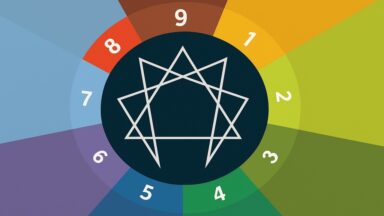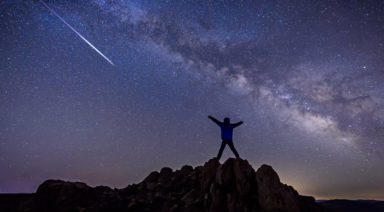Discovering Your Dharma (True Life Path)

“Why am I here?” is probably one of the most commonly asked questions that we all face. Little do we know that this query resonates from our True Self, which gently takes us beyond the world of appearances to discover our inner divinity.
The answer is simple: you manifest in physical form to fulfill a life purpose only you can complete – your dharma. Finding your dharma can be a little more work, but once you figure it out, you can experience complete fulfillment and bliss.
According to the Chopra Center, “When you live in the harmonious flow of dharma, the entire field of pure potentiality opens to you. You’re able to create as much happiness and wealth as you want because you’re aligned with the domain of spirit, the unlimited source of all manifestation.”
The Law of Dharma
The Chopra Center goes on to lay out The Law of Dharma. It consists of three steps needed to align with the spirit and fulfill your life’s purpose with effortless ease.
The first step is the decision to seek your higher Self. You’ve known this is important, but now you have a good goal to reach by doing so. It takes all of us time, but the key is understanding that your essential nature is spiritual and that our potential comes from our divinity.
Secondly, the Law of Dharma instructs you to find your unique talent or gift. The law says that there’s at least one thing you can do better than anyone else on the entire planet. Have you ever found yourself totally absorbed and focus when spending time doing something you love? You don’t notice time passing or any of your circumstances, only following what you love. It’s a beautiful place to be, so finding this unique talent is important not only as a contribution to the world but to your own personal bliss.
Speaking of contributing to the world, to take the third step of the Law of Dharma, you must ask yourself the questions, “How can I use my unique talent to serve humanity? How can I help others?” Then it’s a matter of answering that question and then putting it into practice. When your creative expression helps your fellow human beings, you’re making full use of the Law of Dharma and experience perfect alignment with the infinite field of intelligence.
When you put the Law of Dharma into action, you aren’t struggling or worried anymore! Instead, you start experiencing your life as an ecstatic expression of divinity. An ancient Vedic sage described the natural unfolding of spirit in these beautiful words: “I am the immeasurable potential of all that was, is, and will be, and my desires are like seeds left in the ground: they wait for the right season and then spontaneously manifest into beautiful flowers and mighty trees, into enchanted gardens and majestic forests.”
It sounds like a pretty terrific way to live, right?
Good Places to Start
Here are a few handy tips on how to get started on your quest for your dharma:
- Pay attention to synchronicity. Life is very good at guiding you if you just pay attention. Notice what or who keeps showing up in your life. If someone or something shows up over and over, it’s likely that the person or thing is tied to your dharma.
- Follow callings. Callings are those things that you feel deep inside guiding you that don’t necessarily make sense to anyone else but you. You feel a direction to do something, but it’s not through your mind. These callings are preparation for your personal dharma.
- Know when it’s time to go. If you are feeling like it’s time to move on, then it’s probably time to move on. Your mind might be fighting you, but your soul knows best.
- Be aware that it’s not linear. The path to your personal dharma may, in fact, feel like a spiral. Just when you think you’ve gotten there, you find yourself spinning deeper into some aspect. It helps to surrender to the notion that the journey isn’t always forward.
- Make friends with the illogical. It’s important to know that your dharma is not necessarily coming from a rational place. If you are trying to over-mastermind it, you will probably drive yourself crazy, and your dharma will feel even further away.
- Have a practice that connects you to a greater source. Whether it’s yoga, meditation, painting, or walking in the woods, it’s important to connect with a source greater than you because that’s where the information about your dharma lies and that’s where you’ll find the support to step into it.
- Look at the people you admire. The people you admire tend to represent the greater aspects of you. Put on your detective hat. This can give you clues to your personal dharma.
- Take it seriously, but be light-hearted about it. If you take discovering your dharma too seriously, you may not actually be able to see it. It helps to have a light touch.
- Have the courage to walk into the mystery. If you are committed to discovering your dharma, you’ll need to call in a higher level of trust.
- Allow breathing space. Your dharma is not something you can “catch.” You need to take steps, then leaps, and then let yourself breathe. Patience is an absolute necessity.
10 Signs That You're a Free Spirit

When we think of the term, “free spirit,” we imagine a person who steers their own course in life, unencumbered by common burdens or concerns. Some look at those who identify as free spirits as being irresponsible or childish, though this mindset offers lessons to inform us how we can live life on our own terms.
If you’re someone who considers yourself an independent thinker or doer, who pushes against society’s envelope and is deeply committed to finding your own path, you may be a free spirit. Are you curious as to whether the free spirit path is for you?
Ten Signs You’re A Real Free Spirit
If you identify with any of these signs, chances are you have a free spirit waiting to be let loose into the world!
1. You’re Independent-Minded
Independent people thrive on listening to their own voices, regardless of the situation or circumstance. This key personality trait of the free spirit is a common one in innovators, entrepreneurs, and creative artists, as an independent streak also relies on a strong foundation and belief in oneself.
Are you the person in the room who always finds a new way of looking at things? Free spirits defy expectations and will always see the unexpected in equally unlikely ways. These kinds of thinkers can be great assets on a creative team, as they will always find a new way to look at an idea. Free spirits are also incredible advocates for innovation, as they are not afraid to stand up and for their ideas, no matter how much it veers from the rest of the crowd.
2. Fear Doesn’t Stop You
Dale Carnegie said, “Do the thing you fear to do and keep on doing it… that is the quickest and surest way ever yet discovered to conquer fear.” Free spirits feel fear, but they don’t allow that feeling to be something that stops them. Instead, a free spirit will work through the fear and let it serve as a motivating factor. In fact, most free spirits will tell you that any success is not worth having unless it’s achieved with a healthy dose of moving through fear.
3. You Have a Strong Spine.
While it can be said that free spirits go with the flow of life, they accomplish it with a healthy and strong sense of self. This translates into living with intention and purpose and one that is not defined by anyone else. A free spirit walks the talk and in many cases, creates the language that makes up the talk.
4. Free From Attachment
To live as a free spirit, one has to be willing to let go, or walk away from the things that might weigh others down such as conventional relationships, careers, and other traditional trappings of modern life.
You might find a free spirit selling their material goods and living in a van, or not staying tethered to one place for very long. Or perhaps a free spirit may choose to live simply with a commitment to not participating in consumerism. Minimalism is often a choice of free spirits as this lifestyle embodies freedom from many of the things that weigh us down. Free spirits enjoy their own company and thrive on solo time, and putting themselves first.




































